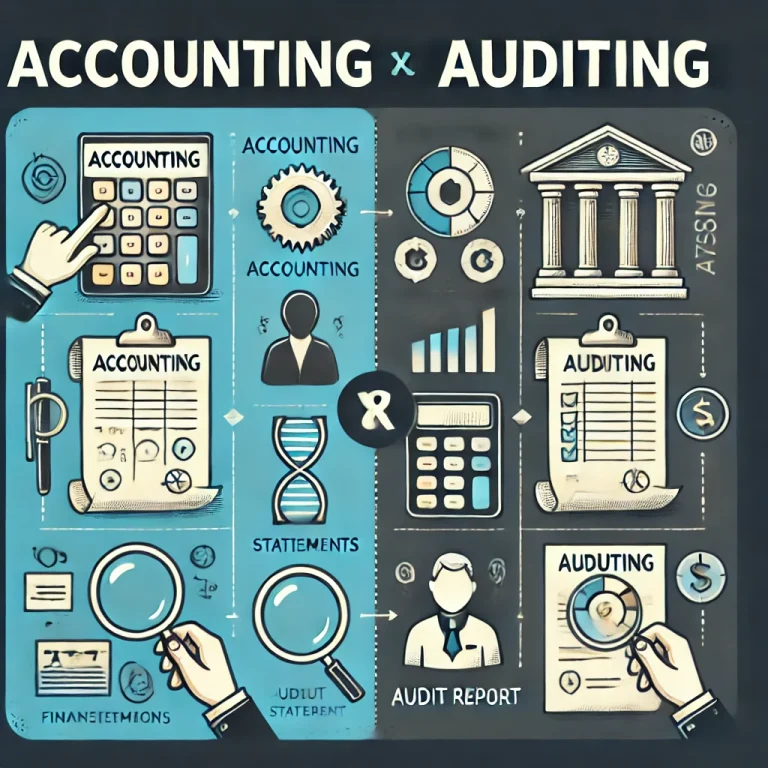In the world of finance and business, the terms “accounting and auditing” often appear together, yet they serve distinctly different functions. Accounting consists of recording, classifying, and summarizing the transactions of an organization to show its financial performance over time through financial statements. In contrast, auditing is the inspection of those financial statements and their accuracy as well as compliance. While both activities are important in financial integrity, they each fulfill specific needs in the management of finances.
What is Accounting?
Accounting is, in fact, a process that systematically organizes and analyses financial activities. It gives a clear view of a company’s financial activities so that business owners and stakeholders may be appropriately advised.
- Purpose: The primary objective of accounting is to offer an accurate financial position of an organization by generating financial statements, including balance sheets, income statements, and cash flow statements.
- Process: It involves recording day-to-day transactions, classifying them, and summarizing data for reporting purposes.
- Outcome: Accounting results in financial statements that inform about profitability, cash flows, and overall financial health.
What is Auditing?
Auditing is the process of examining financial statements and records to verify their accuracy and adherence to applicable laws and standards. It is often conducted by external auditors who review a company’s financial statements to ensure they present a fair and true view of the financial situation.
- Purpose: The main purpose of auditing is to provide an independent opinion on the reliability of financial statements and ensure compliance with regulations.
- Process: Auditors collect evidence, assess internal controls, and check the accuracy of financial records.
- Outcome: Auditing culminates in an audit report that assures stakeholders of the credibility of the company’s financial statements.
Similarities Between Accounting and Auditing
While accounting and auditing have unique purposes, they share certain similarities that underscore their importance in financial integrity and compliance:
- Objective: Both aim to enhance the financial transparency of an organization.
- Financial Data Use: Both rely on financial data to achieve their objectives—accounting compiles it and auditing verifies it.
- Importance in Compliance: Both practices ensure adherence to standards such as Generally Accepted Accounting Principles (GAAP) or International Financial Reporting Standards (IFRS).
Key Differences Between Accounting and Auditing
Although accounting and auditing are interconnected, several distinct differences set them apart:
| Basis | Accounting | Auditing |
|---|---|---|
| Definition | Recording and summarizing financial transactions. | Verifying the accuracy of financial statements. |
| Purpose | To prepare financial statements reflecting the financial position. | To provide an independent verification of financial reports. |
| Process | Involves day-to-day tracking and summarizing of transactions. | Involves examining and evaluating financial records. |
| Frequency | Continuous activity throughout the financial year. | Conducted periodically, usually annually. |
| End Product | Financial statements like income statement, balance sheet, etc. | Audit report providing an opinion on financial statements. |
Role of Accounting
Accounting professionals track the daily record of financials and make sure that all financial transactions occur and are recorded accurately. Responsibilities range from payroll to tracking revenue and expenses. It is an accountant’s job to ensure that records kept are in accordance with the principles and regulations set up for accounting.
Role of Auditing
Auditors focus their attention on checking such accounts, commonly at the close of a fiscal year. These accounts are checked to determine whether they indeed indicate an accurate and just picture of the corporation’s financial condition. Their efforts ensure that the organization is sound financially and compliant.
Why are Both Accounting and Auditing Necessary?
Both accounting and auditing are essential components of financial management.
- Financial Clarity: Accounting gives companies a clear picture of financial performance, which is essential for effective decision-making.
- Compliance Assurance: Auditing verifies this information, ensuring that it complies with standards and regulatory requirements, thus assuring external parties.
- Risk Management: Through financial records and audits, businesses can identify and mitigate risks associated with errors or fraud.
Conclusion
In summary, accounting and auditing have some common objectives the need for financial transparency and accountability. They have different roles in the management of finance: accounting deals with recording and summarizing financial data to determine financial performance, while auditing verifies these records about compliance and accuracy. Together, they give a holistic approach to stewardship, with each being integral to financial information integrity and transparency.
Accounting and Auditing FAQs
What is the main difference between accounting and auditing?
Accounting involves recording and preparing financial statements, while auditing is the process of verifying these financial statements for accuracy and compliance.
Is auditing part of accounting?
While related, auditing is a separate field from accounting, focusing on verifying the accuracy of financial statements prepared through accounting.
Why is auditing necessary if accounting is accurate?
Auditing provides an independent review of financial statements to ensure accuracy, objectivity, and compliance, giving stakeholders confidence in the reported financial health.
How often is auditing conducted?
Auditing is typically conducted annually, though some companies may perform audits more frequently depending on their needs and regulatory requirements.
Can the same person do both accounting and auditing for a company?
No, independence is essential in auditing, so external or independent auditors must conduct audits, separate from the accounting function to avoid conflicts of interest.


